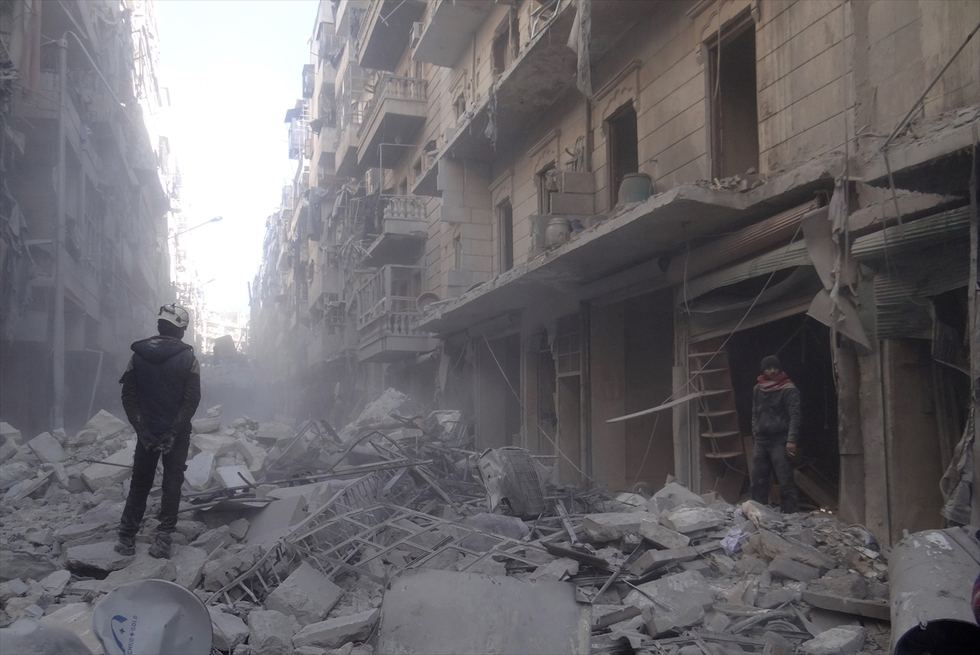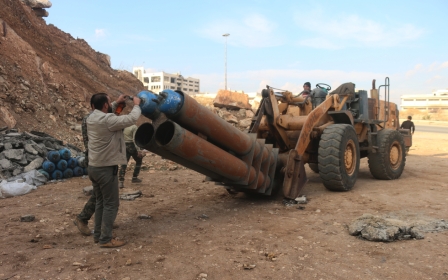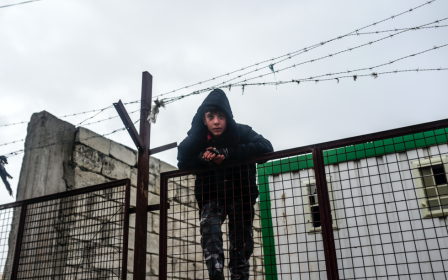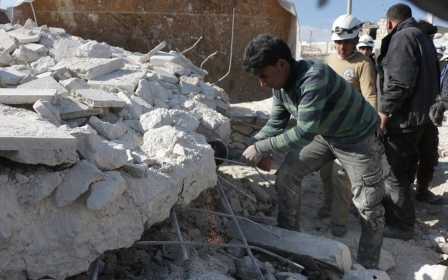'There is no hope': Residents in Aleppo say world has abandoned them

ALEPPO, Syria - Residents of rebel-held areas of Aleppo say that floundering western efforts to broker a peace deal in Syria are irrelevant to people facing a daily onslaught of Russian air strikes and preparing to defend themselves from advancing pro-government forces.
Government forces last week captured a number of villages north of Aleppo, threatening to cut off supply routes from Turkey and encircle opposition fighters and an estimated 400,000 people still living in rebel-controlled eastern districts of the city.
The ferocity of the offensive, which has been backed by hundreds of Russian air strikes in Aleppo and the surrounding area, led to the postponement of a third round of UN-brokered peace talks in Geneva where opposition delegates stated that they would not meet with government representatives until all bombing ceased.
But Aleppo residents spoken to by Middle East Eye said they had already given up on the process and had “no hope” of an imminent end to Syria’s war.
“The entire Geneva conference is a failure. We do not want anything from that conference,” said one man who gave his name as Faris, a resident of the Sukkari district.
“I believe there is no hope, none at all,” said Abu Umar, another resident.
Umm Layla, a street vendor, also said she believed that a peace deal was impossible.
“It is not possible and it will not be possible. You cannot trust these people, they are thieves and liars,” she told MEE.
“This is the third conference. What have the previous conferences done for us? What have they done except bomb us with planes. The planes are killing us.”
'Standing by watching it happen'
Others also condemned the international response to Syria's five years of conflict.
“The killing of the Syrian people over the last five years is unprecedented in that the world is standing by watching it happen,” said a local doctor, who did not want to give his name.
Despite Syrian government claims to have cut off the main rebel supply route into Aleppo and fears of a siege of rebel-held areas, MEE was last week able to enter and leave the city using regular routes through opposition-held territory.
Alternative rebel supply lines remained open, while tens of thousands of civilians have fled and are now trapped at the Turkish border.
Local rebel groups are also making preparations to defend themselves, with fighters pouring into the city from the surrounding countryside.
Some civilians are also taking up arms, with some performing guard duties at night and working in the day.
“People have been dying in such a public way,” said a German rebel fighter who did not want to be identified. “I came here to help when no one else did. Yet if I wanted to return home for any reason then I will be arrested and put into prison. It’s unreal."
Opposition groups in Aleppo range from fighters operating under the banner of the largely secular Free Syrian Army to Islamist militia factions such as Ahrar al-Sham and Jaish al-Islam, and the al-Qaeda-affliliated Nusra Front.
Western areas of Syria's largest city have remained loyal to the government, with much of the centre devastated by fierce fighting long before the government launched its current offensive.
Many in Aleppo expressed concern that advancing pro-government forces would exact retribution on the residents of recaptured rebel territory.
Those remaining are enduring round-the-clock air strikes, with people nervously listening out for the sound of planes overhead.
“The reason for the severe bombardment is that the people here belong to the revolutionaries. They want freedom and they want an end to the regime,” said Abu Jafar, an elderly man who spoke to MEE in the town of Harytan on the outskirts of Aleppo, a few kilometres south of the Shia-majority villages of Nubl and Zahra where government forces last week broke a years-long siege by rebels.
As Abu Jafar spoke, two rockets slammed into a nearby building, forcing him to duck for cover, although neither rocket exploded. He said residents had been living with the constant threat of air strikes for years, but had nowhere to go.
“Go where? A refugee camp? They are bombing those too. It’s better if my family and I are killed in our own home.”
Middle East Eye propose une couverture et une analyse indépendantes et incomparables du Moyen-Orient, de l’Afrique du Nord et d’autres régions du monde. Pour en savoir plus sur la reprise de ce contenu et les frais qui s’appliquent, veuillez remplir ce formulaire [en anglais]. Pour en savoir plus sur MEE, cliquez ici [en anglais].




